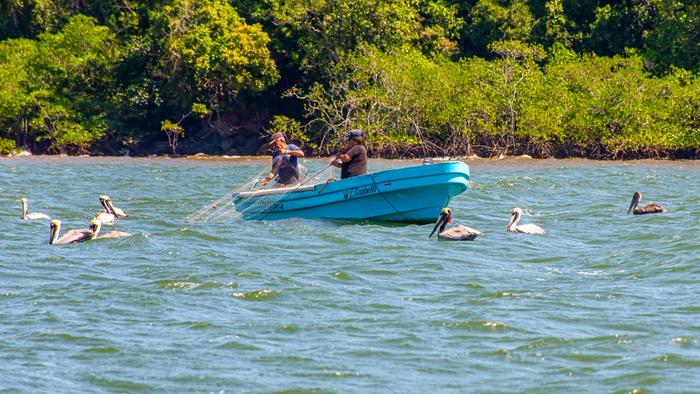For the coastal residents in Sri Lanka, Southern India, and Thailand who survived the 2004 Indian Ocean tsunami that killed more than 200,000 people, the nightmare was just starting. After the disaster, their communities—and with them, their way of life—were permanently relocated inland, clearing the way for tourism development.

Credit: Photo courtesy of Vanessa Crooks/Office of Communications, Smithsonian Tropical Research Institute
For the coastal residents in Sri Lanka, Southern India, and Thailand who survived the 2004 Indian Ocean tsunami that killed more than 200,000 people, the nightmare was just starting. After the disaster, their communities—and with them, their way of life—were permanently relocated inland, clearing the way for tourism development.
Today, people in another part of the world are also facing the threat of displacement. Thousands of villagers who live along the banks of Mozambique’s Zambezi River and depend on the waterway for their livelihood could be forced from their lands if a $4.2 billion mega dam project goes forward in their community.
While differing in the reason for displacement, both cases are prime examples of how poor, Indigenous people in tropical regions are excluded from the decision-making processes that affect the use of their lands.
“The tropics are a biodiversity storehouse, and the majority of people who are directly ocean-dependent live there,” said Daniel Suman, a professor of environmental science and policy at the University of Miami Rosenstiel School of Marine, Atmospheric, and Earth Science. “Those residents can be described as the ‘tropical majority.’ Yet, the laws and policies that affect the oceans and waterways in their countries are often made by international organizations, international financial institutions like the World Bank, and global environmental groups in richer countries located in temperate zones.”
Suman and Rosenstiel School biological oceanographer Claire B. Paris-Limouzy are two of 25 authors—80 percent of whom call the tropics home and three of whom are University of Miami alumni—who recently published a paper in the journal Ocean Sustainability that calls on policymakers to address inequities in ocean science and governance.
“We need to give a voice to the tropical majority,” said Suman, describing the problem as an “environmental justice issue” rife in many tropical countries, particularly in Latin American nations such as Honduras and Ecuador.
“People who live in or near mangroves there and have used those mangroves traditionally but don’t have property title to them have, in many cases, lost access to those mangroves because they have been privatized, or wealthier groups have come in and gotten concessions, legally or illegally, to build shrimp ponds, displacing locals,” explained Suman, who holds an adjunct appointment in the University’s School of Law.
To ensure the tropical majority can play a leading role in maintaining ocean sustainability and ecosystems, policymakers must center equity in ocean governance, reconnect people and the ocean, redefine ocean literacy, and decolonize ocean research, the authors agree.
“From many of the international agreements that come out of high-level United Nations meetings, specific goals related to issues such as sustainable fisheries or marine protected areas are already established,” Suman said. “Specific goals about equity, about fairness to people, about the inclusion of the rights of traditional peoples who rely on the oceans must also be incorporated. And it needs to be solid, actionable goals, not just words.”
Policymakers, Suman added, must incorporate into new laws the indigenous knowledge coastal residents have about the areas in which they live. “That knowledge must be respected just as much as the scientific information developed largely by scientists in wealthier countries,” he said. “Fishermen and poorer people know a lot about the environment. Even though they may not have received a formal education, they know about weather, and they know where the fish are. They know weather patterns, and their knowledge should be respected and included in ocean management.
“And recognizing that traditional users can be good stewards and good protectors of the environment by using their local knowledge is the most effective way to reconnect people and the ocean,” Suman continued. “The hope is that our journal article will help raise awareness about these issues.”
The idea for the article, “Engaging the tropical majority to make ocean governance and science more equitable and effective,” started at the eighth Our Ocean Conference held in Panama last March. Lead authors and Oregon State University researchers Ana K. Spalding and Kirsten Grorud-Colvert, who both earned graduate degrees from the Rosenstiel School, assembled a team of multidisciplinary scientists from around the global tropics to discuss actionable solutions for ocean conservation.
While the group, which included Suman and Paris-Limouzy, discussed the most pressing problems affecting the ocean, they also quickly realized that inequity in ocean governance and ocean science was a matter that required just as much attention.
“The thought was that an article like this might encourage the inclusion of equity in international ocean governance meetings and agreements,” Suman said.
It will be a challenge to accomplish that goal, he admitted.
“Among the biggest challenges is how to include traditional ecological knowledge within the decision-making process. There must be more inclusion and recognition by decision-makers of the need to include local users and invite those people to the table.” Suman said. “And it will certainly be a multiyear effort to make that happen.”
Journal
Nature
DOI
10.1038/s44183-023-00015-9
Article Title
Engaging the tropical majority to make ocean governance and science more equitable and effective
Article Publication Date
6-Jul-2023




